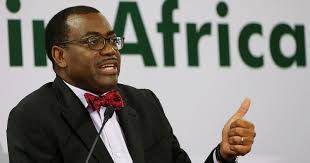A string of corruption and abuse of office allegations has been made against the Nigerian banker and head of the African Development Bank AfDB, Dr. Akinwumi Adesina by some unnamed employees of the sub-regional bank.
Dr. Akinwumi Adesina, the flamboyant banker who is often sharply dressed in expensive tailored suits, white shirts and colourful bow ties is now being questioned after a string of corruption and abuse of office allegations from his own staff spilt into the open. Mr Adesina has denied all the allegations.
Following the US rejection of initial inquiry that cleared him of all the allegations, the board of governors met to discuss whether to engage an external investigator to look into the allegations.Â
The prospects of an independent investigation comes only three months before he was expected to be re-elected unopposed at its annual general meeting expected to come off in August 2020.
The 20-point allegations of "impunity and bad governance" from unnamed employees have shown a disagreement between Mr Adesina and ordinary staff.
The "Group of Concerned Staff Members of the AfDB" claimed that Mr Adesina has used the bank's resources for self-promotion and personal gain while also paying out huge but underserved severance packages to staff who resigned mysteriously, and favouring his fellow Nigerians.
US Treasury Secretary Steve Mnuchin personally signed a letter to the board rejecting an internal investigation that cleared Mr Adesina.
"Mnuchin's move is significant because it has now cast limelight on governance issues and on [the] importance of an independent investigation to uphold the integrity of the AfDB," said Barbara Barungi, the bank's former lead economist on Nigeria. "There are very few people that were willing to stick their necks out."
Besides the core 54 African countries, the US is one of the 27 non-regional members of the AfDB and its second-largest shareholder.
"I think AfDB is Africa's most valuable institution," said one insider who spoke on condition of anonymity.
"But what you have now is the biggest paymaster, the US, in a stand-off against the Africans. If you read Mnuchin's letter carefully, it has put the bank on notice."
The original whistleblowers' email from January 2020 sent to two executive directors of the bank, Yano Takuji (Japanese) and Steven Dowd (American), and the British director for its Integrity and Anti-Corruption Department Alan Bacarese.
Mr Adesina, who holds a PhD in agricultural economics from Purdue University in the US in a statement said, "In spite of unprecedented attempts by some to tarnish my reputation and prejudice the bank's governance procedures, I maintain my innocence with regard to trumped-up allegations that unjustly seek to impugn my honour and integrity," he wrote.
"I am confident that fair, transparent and just processes that respect the rules, procedures and governance systems of the Bank, and rule of law, will ultimately prove that I have not violated the Code of Ethics of this extraordinary institution."
The AfDB board meeting is said to have agreed to an independent investigation into the allegations concerning Mr Adesina's conduct after Denmark, Sweden, Norway and Finland supported the US position, Bloomberg news agency first reported.
"Should it surprise the world that we're getting a second investigation backed by no African country? What does that say about the other countries that have lined up behind the US?" wonders Debisi Araba, a friend of Mr Adesina's.
"He's due to run unopposed but you want to muddy the waters with this stain of corruption. I believe he will be vindicated."
Mr Araba worked for Mr Adesina in the Nigerian government and was also an intern at the bank while doing his PhD in 2009.
He says the bank has always had a culture of salacious rumour and gossip but faults the US for formalizing the "crass, bargain-basement reasoning" into a complaint.
This was denied by a US Treasury spokesperson saying "The United States continues to value the AfDB and its efforts to promote development, reduce poverty, and address the current health and economic impacts of the coronavirus pandemic on the African continent."





